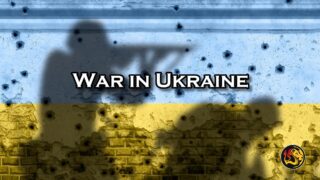
By Stefan J. Bos, Chief International Correspondent Worthy News
KHARKIV/BUDAPEST (Worthy News) – Russia hit Ukraine’s second-largest city with missiles Thursday, killing at least seven people in a printing house and injuring many more, as Ukrainian President Volodymyr Zelensky urged the West to send more weapons to halt Moscow’s increased attacks.
Besides those killed, at least 20 people were wounded when S-300 missiles struck Kharkiv, regional Governor Oleh Syniehubov said.
Explosions reverberated around the city of some 1 million people, with a mother of one telling Worthy News: “It was a terrible morning for me and my baby. Our windows shook a lot.”
Authorities said Russia fired about 15 missiles at the city and the nearby town of Liubotyn, targeting mainly transport infrastructure and a large printing house in Kharkiv, where around 50 people were at the time of the strike.
Zelensky called the attack “extremely cruel” and expressed frustration at not getting enough air defense systems from the country’s Western partners to prevent the barrages after more than two years of unrelenting war.
As the extent of the damage became clear, U.S. Secretary of State Antony J. Blinken reportedly urged the president to lift restrictions on how Ukraine can use American arms.
BIDEN UNCERTAIN
Blinken, who in recent days visited Ukraine, has suggested that Kyiv be allowed to use U.S. weapons inside Russian territory, according to U.S. sources familiar with the talks.
So far, U.S. President Joe Biden demanded that Zelensky agree never to fire them into Russia, saying that would violate his mandate to “avoid World War III.”
But the consensus around that policy is falling apart, with Blinken seeking to allow Ukrainians to hit missile and artillery launch sites just over the border in Russia after Moscow’s recent territorial gains, Worthy News learned.
The city of Kharkiv, the region’s capital of the same name, is about 20 kilometers (12 miles) from the Russian border.
Moscow’s troops have, in recent weeks, captured villages in the area as part of a broad push, and analysts say they may be trying to get within artillery range of the city, forcing thousands to leave their homes.
The latest attacks came while Ukraine’s allies were wrestling with how to squeeze money out of frozen Russian assets to support Kyiv’s war effort as the outlook for Ukraine’s state finances looks shakier.
GROUP OF SEVEN
Finance officials from the Group of Seven rich democracies began meeting Thursday through Saturday in Stresa, Italy, on the shores of scenic Lago Maggiore, to ponder what to do with the Russian central bank reserves frozen in response to the invasion of Ukraine.
Ukraine and many of its supporters have called for the confiscation of $260 billion in Russian assets frozen outside the country after the February 24, 2022, invasion.
However, European Union officials have resisted, citing legal and financial stability concerns, including possible reluctance among major investors to keep using Western banks.
Most of the frozen assets are located in Europe.
Experts say that a European plan to use the interest on the Russian funds merely would provide only a trickle of money every year — about $2.5 billion-$3 billion at current interest rates.
Yet that would barely meet a month’s financing needs for the Ukrainian government as it fights Europe’s bloodiest conflict since World War Two.
With hundreds of thousands already killed and injured on both sides, questions remained about how long Ukraine would be able to continue its battle against Russia’s much larger military.
Copyright 1999-2026 Worthy News. This article was originally published on Worthy News and was reproduced with permission.
Latest News from Worthy News
The Trump administration has finalized a sweeping reciprocal trade agreement with Taiwan, confirming a 15 percent U.S. tariff rate on Taiwanese imports while securing broad new market access and purchase commitments for American goods.
Democrats are applauding White House border czar Tom Homan’s Thursday announcement that immigration enforcement operation in Minnesota will end next week.
Democrats in the U.S. Senate tanked the Homeland Security full-year funding bill in a last-ditch vote Thursday, all but guaranteeing a partial government shutdown starting Saturday.
Mourners in a remote Canadian town grappled Thursday with the aftermath of one of the country’s deadliest school shootings in decades, as families, survivors and leaders reacted to the tragedy that left eight victims — most of them children — dead, along with the 18-year-old suspect.
A gunman who opened fire at a school in southern Thailand’s Hat Yai city on Wednesday wounded a teacher and a student before being detained, authorities said, in a rare attack that sent students and staff into panic.
The Republican-led House of Representatives has passed the Safeguard American Voter Eligibility (SAVE) America Act, advancing legislation that would require proof of citizenship to register to vote and photo identification at the polls. The bill now heads to the Senate, where its future remains uncertain amid strong Democratic opposition.
Israel’s Ministry of Defense announced on Wednesday that its advanced David’s Sling air and missile defense system has completed a series of complex modernized tests, a development officials say bolsters the country’s defensive posture as tensions with Iran escalate and the United States prepares military options that could include direct strikes.







